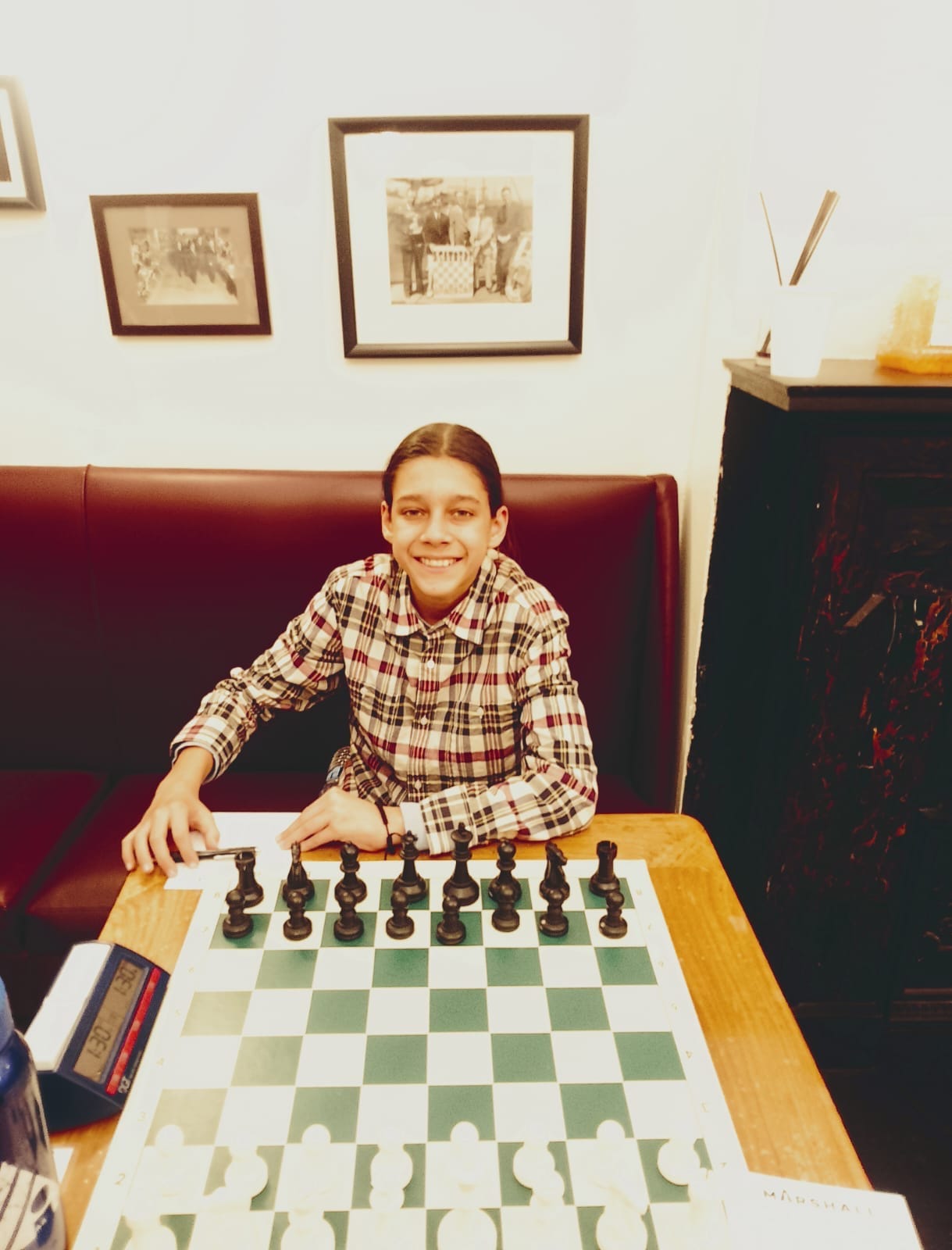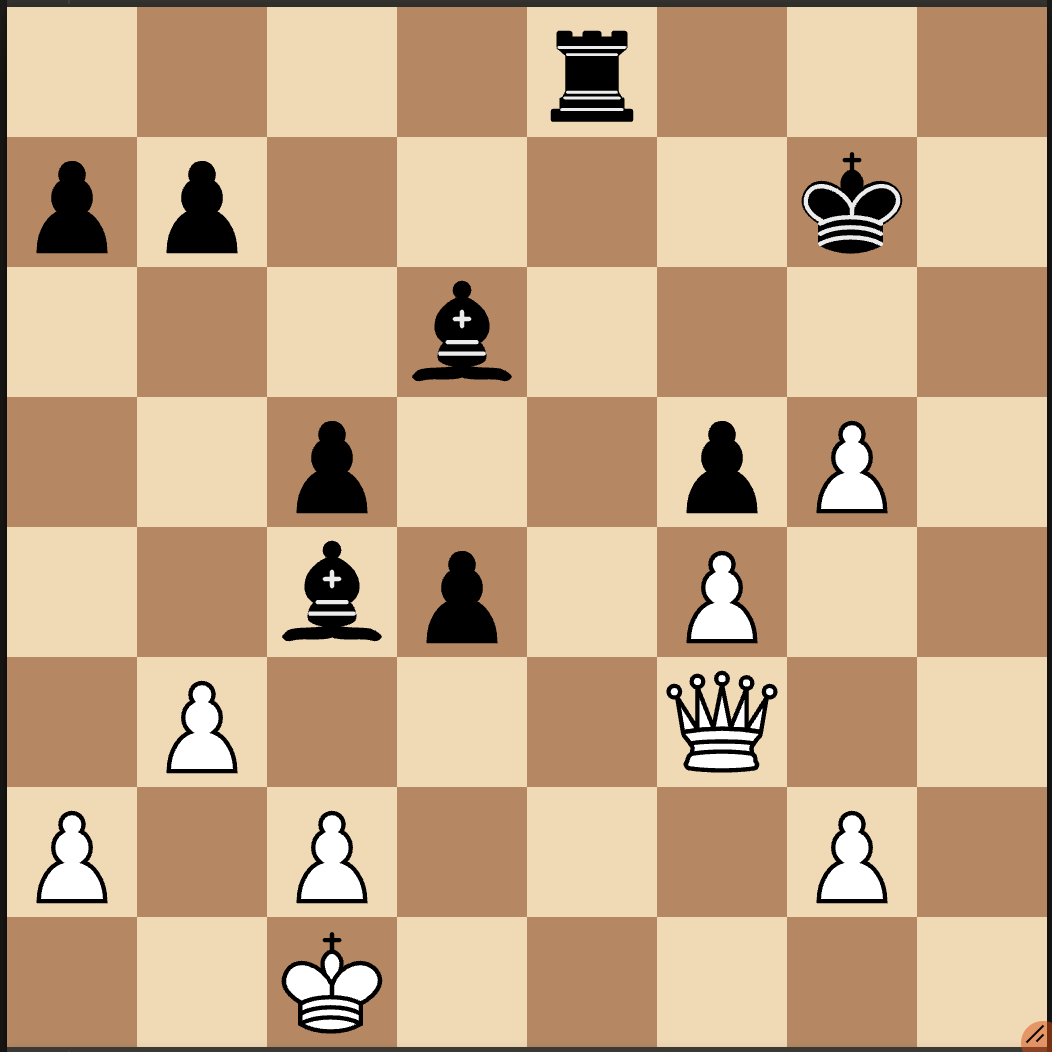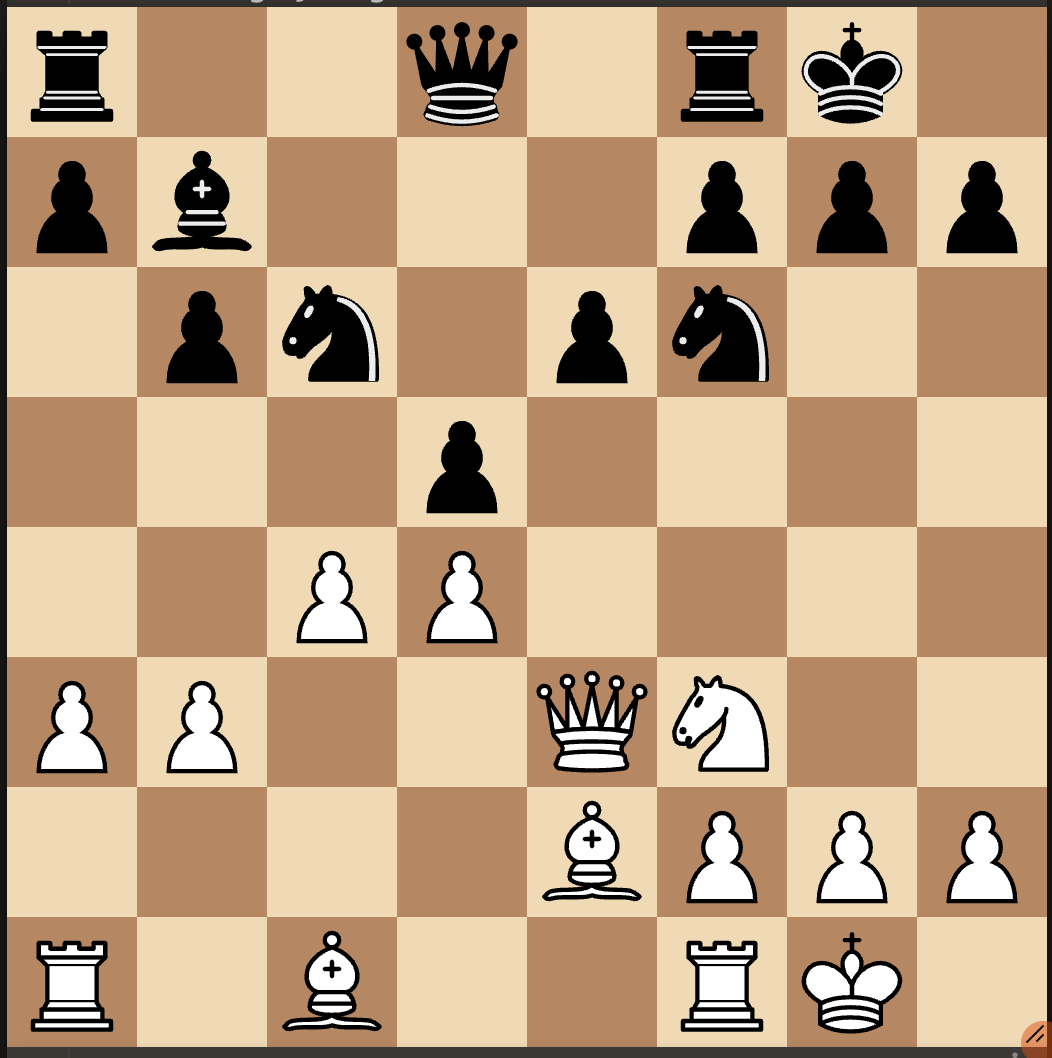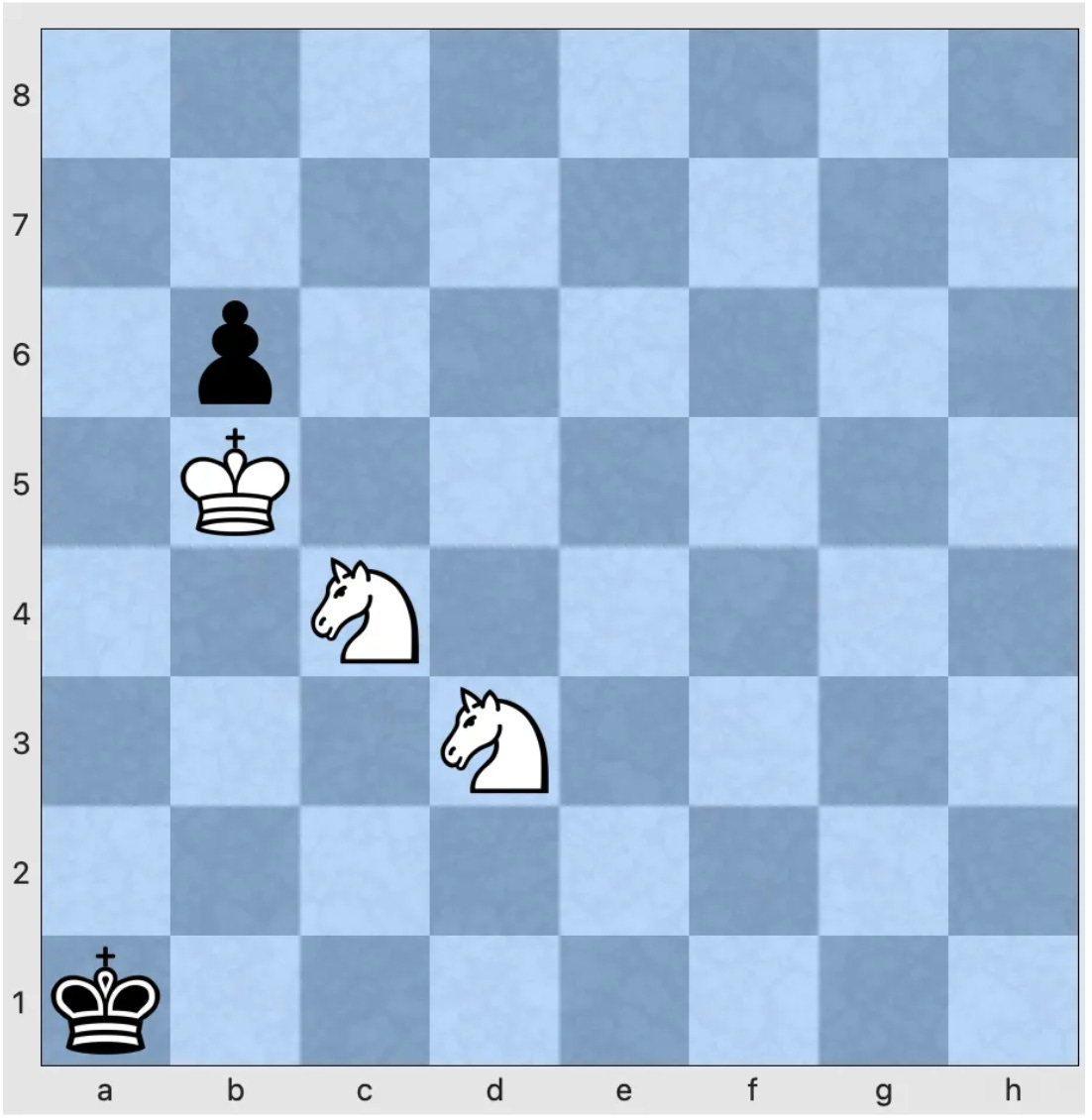In This Issue: From The Skittles Room Annotated Games from the Marshall FIDE Premier, by GM Aleksandr Lenderman Soltis to Enjoy: A Marshall Champion Looks Back, by Jeffrey Tannenbaum Chess Toons En Passant Problems, Problems, curated by Alexander George Editor's Note
Welcome back, fellow chess players, to this edition of the Marshall Chess Club's fortnightly bulletin, The Marshall Spectator.
As the end of the year approaches, we are looking forward to our club championship cycle. This past weekend we held our first-ever Rapid and Blitz combined Championship. Congratulations to our 2024 Marshall Chess Club Rapid and Blitz Champion, IM Mykola Bortnyk. Games from the event can be seen here.
Looking ahead, please save the dates for our other upcoming club championships: November 15-17, the Mona Karff Memorial/Marshall Women’s Championship will run concurrently with the Marshall Chess Club Senior Championship. The following weekend, November 22 - 24, will be the Jerry Simon Memorial and Marshall Amateur Championship, which is also a qualifier for our club championship happening in December. The 108th annual Edward Lasker Memorial and Marshall Chess Club Championship will take place December 12-15, culminating with the crowing of the 2024 club champion.
Are you an adult looking for a way to improve your chess? Come get some games analyzed by an International Master on Thursdays at the Marshall.
For Marshall Members - every Thursday - game analysis with the “IRON MAN” IM Jay Bonin from 6pm-7pm. It’s the perfect way to get warmed up before playing in the Thursday Night Action tournament or Thursday Open.
In other chess class news, IM Silas Lund will be doing a 5-class online course on endgames taking place October 21, 28, Nov 4, 11, and 18. The entry fee for all classes will be $100. Register here
Complex endgames are endgames with at least 2 pieces, with elements of the middlegame, and where difficult decisions still need to be made in terms of exchanges and pawn advances before the position settles into something more familiar in terms of basic or technical endgames. We analyze games from participants, if submitted. Hand in at least 3 days before the day of class. Otherwise, we will analyze interesting endgames from chess history.
We are thrilled to launch a new series of Chess Workshops for Kids at our historic club. Registration dates for all camps this year are up. Our camps will be open to all scholastic members and we will cap each camp date at 40 kids. The entry fee is $130 per camp session, and will be led by GM Djurabek Khamrakulov. We look forward to inviting special guests for simuls and lectures. Here is the schedule for the rest of the year:
November 1, 2024- Special simul, speed chess, and more with GM Andrew "penguingm" Tang!
November 5, 2024
November 11, 2024
December 26, 2024
December 27, 2024
December 30, 2024
December 31, 2024
The club will provide lunch (chipotle/ pizza) and snacks throughout the day, as well as park play if the weather permits. We will also have a camp “piggy bank” in which a portion of registration fees will go into for each camp day. Campers who participate in at least 4 camp days this year will be eligible for a free super tournament next year with prizes (up to $2000 in value!) in the form of private lessons, trophies, merchandise, and much more.
The Marshall Spectator is also excited to announce the club’s partnership with ChessMood, an online chess training platform that helps players improve their game with courses, training, and other resources. Using the link below, members will receive a ChessMood membership free for one month if they claim it between October 1st and November 1st! Renewing members will also receive one month free. People who sign up for a ChessMood membership will receive a discount and help support the club.
Get your one month free here: https://chessmood.com/gifts/marshall
View some ChessMood Success Stories here: https://chessmood.com/success-stories
On the theme of chess improvement, the editors of the Marshall Spectator recently received an email from an old friend of the club, the wife of the late GM Miron Sher, who has recently helped to publish an instructional chess book.
Dear Friends at the Marshall Chess Club,
After several years of concentrated effort, we have published an instructional chess book "Dream Moves: Eye Opening Chess Lessons for Improvers" by my late husband Grandmaster Miron Sher. Miron has taught at a number of NYC schools including 318, P.S. 070, Dalton, Stuyvesant, Churchill, Browning and many others as well as instructed coaches and advanced students for Chess-In-The-Schools. Miron also taught many private students and hosted a number of his chess camps at the Marshall Chess Club over the years. Miron coached a number of strong US chess players including Robert Hess, Fabiano Caruana, Justus Williams, Keaton Kiewra and many others and was a Marshall Chess Club champion in his own right. Miron has always been a strong supporter of NYC and scholastic chess and the Marshall Chess Club in particular.
Book Description: Do you want to do the same chess homework that world-famous grandmasters Fabiano Caruana, Robert Hess and Peter Heine Nielsen did in their formative years as chess players? This book will test you with hundreds of positions created by their coach Miron Sher (1952-2020). Just like Fabiano, Robert and Peter, you are not supposed to stop after the first move. You have to find the last move of the solution!
Miron Sher is one of those legendary coaches who got their chess education in the Soviet Union and in later years spread their knowledge in Western Europe and the United States. He was born in Ukraine, studied in Moscow, coached the Russian national team and emigrated to New York in 1997. There he taught at various schools and worked privately with dozens of students.
Dream Moves focuses on five themes that Sher considered important for chess improvement.
An unprotected piece – the trigger to start thinking tactics!
In-between moves – they help you spring a surprise on your opponent
Open files – a fundamental element of chess strategy
The 20% Rule – if your pawn has advanced to the 5th or 6th rank, moving it forward is quite often your best option
Dream Move – dream about the final, decisive move, and you will find the way there
The book contains close to one hundred illustrated games and more than three hundred puzzles. Do as the legends did - and use these puzzles to sharpen your tactical skills and improve your understanding of chess. Free sample of the book and purchase link.
Over the last two weeks we have had a plethora of events for our members to play in.
The Wesley Hellner Action on October 10 had 34 players registered and was won by Vladimir Bugayev, who scored a perfect 4 out of 4 to win $128. IM Kevin Wang came in second place, scoring 3.5 out of 4 to win $85, while Philip Uy won a class prize of $64 for his 3 out of 4 score. The following players shared in the remaining prize money, winning, $32 each for their 3 out of 4 score: Bryan Weisz, Wyatt Wong, William Aepli, and Andrew Colwell.
The Rated Beginner Open on October 6 had 38 players and was won by Milan Chadha, Bastian Brueggen Arando and Edgar Lievano who scored a perfect 3 out of 3 to win $150 each.
The FIDE Premier Open that concluded on October 6 had 39 players registered and was won by FM Liam Putnam, who scored a perfect 5 out of 5 to win $907. Michael Li scored 4 out of 5 to win the 2nd place prize of $510, while the following 3 players scored 3.5 out of 5 to win $94.67 each: Pranav Swaminathan, Luc Hoffman, and CM Aditeya Das.
The FIDE Premier Under 2000 which concluded on October 6 had 51 players registered and was won by Levi Kalani Fogo Esquivel, who scored 4.5 out of 5 to win $850. Liam L Kojuharov scored 4 points, to win a class prize of $255, and Shawn Jiang scored 2 points to win a class prize of $213, while Justin Dalhouse and Lucas Chen scored 4 winning $170 each and a share of the place prizes. The following 4 players scored 2 out of 5 to win a class prize of $63.75 each: Henry Mingzhe Li, Darwin Wong Okyere, Johnson Weng, and Caroline Chu.
The Under 2000 Morning Action on October 5 had 49 players registered and concluded with the following 5 players scoring a perfect 3 out of 3 to win $80.60 each: Somario Blagrove, David Campbell, Manish Suthar, Aidan Amin, and Chris Weldon. Matthew Chan and Shu Chen won a class prize, scoring 2 out of 3 to win $86.50 each.
The Morning Masters on October 5 had 6 players registered and was won by CM Aditeya Das and Dominic Paragua, who scored 2.5 out of 3 to win $37.50 each.
The Wesley Hellner Action on October 3 had 42 players registered and and was won by IM Jay Bonin, who scored 4 out of 4 to win the $150 first place prize. Vladimir Bugayev scored 3.5 out of 4 to win $100, while Alving Lou scored 3 points to win a class prize of $75. The following players shared in the remaining prize funds, winning $25 each for their 3 out of 4 score: Thomas Knoff, William Aepli, Andrew Colwell, FM Tanitoluwa Adewumi, CM Aditeya Das, and Wyatt Wong.
The Rated Beginner Open on September 29 had 47 players registered and concluded with the following players winning $115 for their perfect 3 out of 3 score: Radna Lumbotsyrenov, Sanaya Chisolm, Andy Fu, William Chan, and Seokwoo Lee.
The Sunday Quads on September 29 had 88 players, making up 20 quads and 1 small swiss. The following players won $50 each: Ethan Kozower, Kevin Stern, Phineas Weingarten, Grayson Xiang, Matthew Shirvell, Nico Alvarado-Yoshida, Rishan Malhotra, Mason Zhu, Anna Radchenko, Zachary Nazimowitz, Mateo Cordova, and Ayden Lim. The following players won $25 each: Alice Chovanec, WCM Arabella Fang, Miles Stringer, Marissa Lu, Jacob Bleiberg, Leandro, Wayne Chien, Myra Nigam, Shuman Lyu, and Kaileigh King. And the following players shared their quad 3 ways, winning $16.67 each: Charles Huang, Anthony Li, and Eli Blei-Gantz, Jerry Liang, Israyel Simmons, and Adolfo Ferrando.
The Under 2000 Morning Action on September 28 had 42 players registered and was concluded with no fewer than 4 perfect scores, with the following 4 players winning $90 each for their 3 out of 3 score: Axel Peters, Selvin Ramirez, Carlo He, and Manuel Najera. The following 6 players who shared in a class prize, winning $25.67 each for their 2 out of 3 score: Rico He, Brianna Zhou, Eugene Bang, Noah Hsu, Mattingly Taveras, and August Malueg.
The Saturday Game 50 Open on September 28 had 43 players registered and was won by IM Jay Bonin, IM Justin Sarkar, and Alvin Lou who scored 3.5 out of 4 to win$157.67 each, and Shu Chen won a class prize of $86 for an impressive 3 out of 4 performance.
The Adults Only Tournament on September 28 had 13 players registered and was won by David Timmerman, who scored a perfect 3 out of 3 to win the $130 first-place prize. The following 4 players won $8.25 each for their 2 out of 3 score: Monika Lee, Khoa Le, Sean Luong, and Dyaln Fountain Yu.
The Morning Masters on September 28 had 11 players registered and was won by Spencer Chin and Aditeya Das, who scored 2.5 out of 3 to win $69.50 each.
The FIDE Blitz on September 27 had 38 players registered and was won by FM Liam Putnam and IM Nico Chasin, who scored 8 out of 9 to win $142.50 each. WFM Chloe Gaw scored 7 out of 9 to win $47.50, while Elliot Goodrich also won $47.50 for his 6.5 out of 9 score. The following 4 players won $23.75 for their 5 out of 9 score.
Finally, another spectacular result that we would like to report is that our own Levi Kalani Fogo tied for first place in the Under 2000 section of the 3rd Skyline Open this weekend in the DMV area. Congratulations Levi on an excellent result.
We look forward to seeing you at the club soon!
Annotated Games from the Marshall FIDE Premier, by GM Aleksandr Lenderman
This month's Marshall Premier boasted 39 players, with quite a few titled players. There were no GMs, but the top seed GM-elect Josiah Stearman has all 3 GM norms and just needs the 2500 FIDE rating to get the title. IM-elect Liam Putnam ended up being a convincing winner with a score of 5/5, surpassing 3 IMS, and beating two of them on the last day. Liam Putnam is an IM who just hasn't had his title confirmed yet by the Congress, as he has broken the necessary requirements (2400 FIDE and 3 IM norms). A big fight arose in round 4 between Stearman and Putnam. Putnam had 3/3 and Stearman had 2.5/3, so Stearman was definitely aggressively playing for a win in this game, as it was his best chance to win the tournament. What arose was a very interesting skirmish with all 3 results possible, in which Putnam was able to prevail.
You can play through the moves in the games in this article with annotations here.
Round 4: Stearman, Josiah - Putnam, Liam
1. e4 e5 2. Nf3 Nf6 Black chose the solid and reliable Petroff Defence, which has been the main repertoire of many top players, including two-time World Championship challenger, Ian Nepomniachtchi. It's a very logical opening choice given that it's a solid opening, and White is the one who needed the win more given the tournament situation.
3. Nxe5 d6 4. Nf3 Nxe4 5. Nc3 White goes for the most principled line.
5... Nxc3 6. dxc3 Be7 7. Be3 O-O 8. Bd3 Deviating from the move line, which is 8. Qd2. 8... Nd7 9. Qd2 d5 10. O-O-O c6 Now, this transposed back into the main line territory, where white often plays Bd3 anyway, after castling.
11. h4 Nc5 12. Ng5 h6 13. Rde1!? Here White again, deviates from the main line, which is 13. Kb1, and White spent about 13 minutes here, so most likely White was either out of his book or trying to recall his lines. However, it turned out to be a good practical choice for White, as here Black, who previously was blitzing his moves, went into a 30 minute tank. The long think makes sense in a position like this, since it's very sharp, and one mistake in an opposite castle position can become fatal. (13. Kb1 Is the main line.)
13... Nxd3+ 14. Qxd3 hxg5?! Here, objectively speaking, Black errs, but the position is still extremely complicated, so it is very hard for White to capitalize, as it requires engine-like precision in some cases. (14... f5 Was played by Aronian against Nakamura where Black got an acceptable position. 15. f4 Bd6 (15... Qd6!?) 16. Nf3 Re8 17. g3 Re4 18. Nd2 Be6!? 19. Nxe4 fxe4 20. Qd2 Qa5 ½-½ (55) Nakamura,H (2736)-Aronian,L (2773) chess24.com INT 2020 Black got a decent compensation for the exchange, and after many moves, the game ended in a draw.)
15. hxg5 f5 16. f4! A very strong move, and the only way to get an advantage. (16. gxf6? Rxf6 Would not lead to mate, as black has the f7 square for his king.) 16... Qd6!
Black is up to the task, finding the only defensive move to avoid losing immediately. (16... Be6? 17. Bd4 Qd7 18. Qh3 Kf7 19. Qh5+ g6 20. Qh7+ Ke8 21. Qxg6+ Bf7 22. Qh6 Is a sample line where White breaks through.)
17. Rh4?! White returns the favor. White had a very narrow way to get a huge advantage. (17. Bd2!! Was the only way. The idea is 3-fold. First of all, bishop on d2, keeps an eye on the f4 pawn, unlike the more active Bd4. Secondly, white opens up his queen to go to d3, and finally, white opens the e-file for his rook. Black will objectively face a very difficult defensive task here. However, seeing all the key lines, let alone evaluating them would probably be a difficult task, even for a top GM. Here are some sample lines: 17... Bd8! (17... Kf7 Is also an interesting try but white crashes through here. 18. g4! Only move to get an advantage but it's enough. 18... Ke8 (18... fxg4 19. Qh7! 19. c4! After this strong move, potentially opening up Bb4 and Bc3 ideas, white has a long-lasting attack, with ideas like Rh7, and so on. 18. c4! This move is still very strong. (18. Qh3?! Qg6 Holds for black!) 18... Bd7! The strongest defense. (18... d4?! 19. Qh3 Qg6 20. Bb4 Now, the difference is that the b4 square is opened for the bishop, and white wins.) 19. cxd5 cxd5 20. Kb1! It is not obvious how, but white has a big initiative, and the black king cannot really find shelter here. White's play is long-lasting here, and white is much better.) (17. Bd4? Qxf4+ Would of course, not work.) (17. c4? Would be premature due to 17... Bd7)
17... Qg6 Now, Black is fine. 18. Bd4 Re8 19. Qh3 Be6 20. Rh1 Bf8! 21. Qg3 Kf7 Technically an inaccuracy, but once again, the position is very complicated, and probably would even be for a top 10 player in the world. (21... c5! Might've been a good winning attempt, but again, the lines become very complicated here. 22. Bf6!? Bd7 23. Rh8+ Kf7 24. R8h7 Re6!! Otherwise, it's a draw. 25. R1h6 Rxf6 26. Qf3! Qxh6! 27. Qxd5+ Kg6 28. Rxh6+ gxh6 29. gxf6 Bc6 30. Qg8+ Kxf6 At the end of this crazy line, black looks to be better, but still a very long way to converting.)
22. Rh7 Kg8 23. Rh8+ Kf7 24. R1h7 A winning attempt, very understandable given the tournament situation, but objectively, this hands the advantage to Black. (24. R8h7 Black would be forced to make a draw here due to R1h6 threat. 24... Kg8 25. Rh8+)
24... c5 (24... Rac8 Might've been more accurate.) 25. Bf6 Bd6?! Black wants to resolve the tension but now, White gets a slight upper hand. (25... Rac8)
26. Rxg7+ Qxg7 27. Rxe8 (27. Bxg7 Rxh8 28. Bxh8 Rxh8 29. Qf3 Was slightly more accurate.)
27... Rxe8 28. Bxg7 Kxg7 29. c4 d4! 30. Qf3 Bxc4 31. b3?
After a long an intense fight, White makes the decisive mistake. b3 turned out to be too slow. It looks like black is consolidating, and with his material advantage and active pieces, is about to take over, but White still had a shocking resource to potentially even have the initiative. (31. g3!! The idea is the very sneaky Qh1! 31... Re1+ 32. Kd2 Re4 33. Qh1 Bf8! 34. Qh6+ Kg8 35. Qg6+ Bg7 36. Qxf5 Re2+ 37. Kd1 Rf2 Here, with perfect play, this will be a draw.)
31... Bf7 32. g3 c4! Now, that Black has consolidated his king, Black is the one who is taking over the initiative and is now attacking White.
33. bxc4 Re1+ 34. Kb2 Re3! The last accurate move which finishes off the game.
35. Qh1 Ba3+ 36. Kb1 Kg8 37. g4 Bb4 38. Qxb7 Bc3 39. Qc8+ Re8 And here, White resigned as he either loses the queen or gets mated. A very impressive fight where Liam Putnam was able to prevail over his more experienced and higher-rated opponent. 0-1
Round 5: Putnam, Liam - Kevin George, J
In the last round, Liam Putnam was paired against another IM, Kevin George Girgis, an IM whom I have never heard of, surprisingly. Putnam had 4/4, Girgis had 3.5, and no one else had more than 3, meaning that a draw would secure Putnam the clear win. I was impressed by this game, as Putnam clearly played for a win from the very beginning, which is usually the better way to try to get a draw. White ended up doing even better and even getting the win, which netted him all-important rating points on his road to becoming a GM.
1. d4 Nf6 2. c4 e6 3. Nf3 Bb4+ 4. Nbd2 b6 5. a3 Bxd2+ 6. Qxd2 Bb7 7. e3 O-O 8. Be2 d5 9. b3 c5 10. O-O cxd4 11. exd4 Nc6 12. Qe3
(12. c5!? Perhaps this promised White more chances for an advantage.) 12... Rc8 (12... a5! Was strong for black, either trying to get in a4, softening the c4 square, or forcing white to play a4, which gives black the b4 square.)
13. Bb2 Ne7 14. Rac1 Nf5 15. Qf4 dxc4 16. bxc4 This is solid for Black but also, it is quite a risk-free position for White.
16... Qc7 17. Ne5! White correctly keeps the queens on the board since, structurally, White might be a bit worse with his hanging pawns, meaning he will have better chances by attacking.
17... Nd7 18. d5! f6 19. Nd3 Qxf4 20. Nxf4 Black is able to trade queens, but at a cost of weakening the e6 square and also, the h3-c8 diagonal. White takes advantage of these weaknesses.
20... exd5 21. Bg4! g6 22. cxd5 Rxc1 23. Rxc1 Rc8 24. Re1! White keeps the rooks on the board, which is a good practical decision since he is able to create initiative here on the e-file.
24... Kf7 25. h4 Re8?! The start of a wrong plan. (25... Rc4 26. g3 Nc5 I'm a bit surprised black didn't try to create counterplay here, especially since black needed a win in this game to leapfrog Putnam in winning the tournament.)
26. Re6 Ne5?! (26... Rc8! It was still not too late to return to the open c-file, but practically it's hard to play such a move after just playing Rc8-e8.)
27. Bxf5 gxf5 28. Rd6! Perhaps Black missed or underestimated this idea. Now, White has lots of initiative.
28... Ng4?! (28... Ke7 might still be holding.) 29. Bc3!
Accurate move, of course, to cover the e1 square. 29... Rc8?! Now, White is simply winning.
30. Rd7+ Ke8 31. Rxb7 Rxc3 32. Kf1 Rc2 33. Ne6 White's construction is simply too strong, and will create decisive threats on the black king.
33... Ne5 34. Rxa7 h5 35. d6 Nd7 36. Ng7+ Kd8 37. Ra8+ Nb8 38. Rxb8+ Kd7 39. Nxf5 Rc5 40. Rb7+ Ke6 41. d7 Rd5 42. Ne3 Putnam showed a very impressive endgame technique on his way to a very impressive 5/5 score. On the last day, Putnam displayed very clutch nerves against two IMS, winning both games in two different styles, with the first one being in a crazy tactical mess and the second game in a technical fashion. Putnam clearly exhibits universal skills, which is quite critical to go far in chess. Putnam's future in chess definitely looks bright! 1-0
GM, Marshall Spectator Contributors
Soltis to Enjoy: A Marshall Champion Looks Back
Andrew Soltis, the nine-time Marshall Chess Club champion and the biographer of our founder Frank J. Marshall, had to hustle on a memorable day in August 1971.
First, he had to blaze through 22 games of five-minute chess. He placed second in the field, topped only by Bobby Fischer – and suddenly the real rush began. Soltis, reporting for the New York Post, had to phone the tabloid and dictate rapidly an account of Fischer’s triumph, lest his employer be scooped by the New York Times. Soltis ‘’avoided disaster’’ to his career through the quick work, he writes in “Deadline Grandmaster: A Chess Memoir “ (McFarland, 368 pages, $39.95 on Amazon).
Soltis, age 77, has been juggling two of his biggest passions – chess and writing – for decades. The pursuits have something in common: ‘’Intuition was invaluable in both.’’ And deadline pressure at the Post, where Soltis plugged away for 47 years before retiring, resembled tournament time pressure. He thrived in both arenas. He presents his story in 13 chapters, and each is broken into multiple sections. They are set off by subheads, like this:
Home-Grown Grandmaster
The blitz games with Fischer took place at the now-defunct Manhattan Chess Club. And while Soltis received an International Master title – the second-highest rank – on the basis of play in Reggio Emilia, Italy, in the 1970s, he earned his Grandmaster norms entirely at New York venues including the Marshall. He got the GM title in 1980. Competing abroad infrequently, Pennsylvania-born Soltis instead became a powerhouse in New York, winning our club championship more often than any other player. Yet he has always been an amateur player, never a professional. That he could fare so well at the board while also managing a demanding career outside chess should be heartening to many others at the Marshall and elsewhere.
You may have read some of his story before. In ‘’Confessions of a Chess Grandmaster’’ (Thinkers Press, 1990), Soltis dissected 55 games, attempting to give ‘’an honest account of what it’s like to be a grandmaster,’’ after concluding that many people thought GMs are more brilliant than they really are. He had wanted to call the earlier memoir ‘’Confessions of a Weak Grandmaster.’’ The publisher balked.
Soltis still is nothing if not modest, or at least he goes out of his way to appear that way in his writing, admitting to multiple blunders both on and off the board. While showing 87 of his wins in the new book, by my possibly flawed count, he also presents 18 losses (one was scripted, for a living-chess exhibition). And there are more than a dozen draws, plus assorted battles between others players. While some content overlaps with the earlier book, the author used computers to help improve the analysis and he revised his commentary – now often strikingly self-critical, knocking his endgame technique, for example.
Yet he must think highly of himself; else, why undertake this second memoir in the first place? He defeated opponents, including GM Svetozar Gligoric, GM Bent Larsen, and GM Oleg Romanishin, often after avoiding mainline theory in popular openings. Against Romanishin, his only ‘’Soviet scalp,’’ he chose the Mieses Variation, a quiet line of the Vienna Game. In the book, his most-frequent opponent --George Kane, another former Marshall champion -- has one victory against Soltis and three losses.
While Soltis doesn’t always give the complete moves of games – I would prefer seeing them all -- he doesn’t scrimp on something more valuable: tips that can greatly aid learners. For instance, he advises that any player faced with an apparently winning endgame must take time to imagine ways that a loss might occur instead. This helped him beat Orest Popovych in 1976. But he knows that any such sound advice can be easily forgotten. Under deadly threat in a 1991 game with GM Bosko Abramovic, Soltis resigned – incorrectly. He failed to consider a rook check that he could have delivered himself, promising a win in all continuations. That happened after he didn’t heed his long-standing rule of always evaluating the most forceful moves possible. Other tips are transposition tricks in openings, almost always of high interest to club players.
Conflicts
Soltis also recaps his long career at the Post and describes himself as the fastest writer there. One of his specialties was producing a weekly chess column, which he retained after giving up his full-time job in 2014. Every year, he worked on holidays, including Thanksgiving, Christmas, and New Year’s Day, stocking up time he could use for chess or travel. He liked this arrangement, but his job often was insecure, given a series of nightmare episodes in the ownership history of the newspaper. And occasionally there were conflicts between the demands of journalism and Soltis’s desire not to hurt chess or its players. In a fascinating three-paragraph section under the subhead ‘’ Punches Pulled,’’ he tells, for instance, of omitting from the Post the names of players who died of AIDS. More admirably, he withheld some details from stories to protect people who gave him information.
In the book there are also moments when Soltis skimps on specifics, possibly to avoid embarrassing people. Citing nobody, he reports that the Marshall, around the time of the boom in U.S. chess inspired by Fischer’s world title in 1972, was the venue for casual hook-ups ‘’in the second-floor rooms’’ – and also had a ‘’secret basement’’ that was ‘’used for casual pot-smoking...’’ I’m not sure how the basement could ever have been a secret (maybe its uses were little known), but assuming any of this was clandestine, how does Soltis know about it? He also reports that a friend of his received a $300,000 advance for a chess book that flopped. This is an eye-popping figure, enormous in chess publishing, and crying for more detail. At the very least, what was the book about? How many copies did it sell?
In other passages, Soltis is generous with details that make his book quite amusing. He met his wife, Marcy, at the Marshall, and their interests came to include a collection of teddy bears, one of which they named Feddy the Teddy, after John Fedorowicz, now a GM, who is seen in a photograph holding Feddy. This and other pictures in the book are terrific. Soltis, after all, does know that readers ‘’expect lots of deets.’’ As he puts it, ‘’Even trivial details enhance the credibility of what you write.’’
I Voracious
Beyond the Post, he had other outlets for his talent. Monthly, he writes the popular ‘’Chess to Enjoy’’ feature in ‘’Chess Life’’ magazine, and he relentlessly produces chess books – dozens to date. His book ‘’Frank Marshall, United States Chess Champion: A Biography With 220 Games’’ (McFarland, 1994) still has an edition in print. He has also turned out opening manuals, books on strategy, and, probably his most admirable work, a series on Soviet chess history.
The author revisits many of these earlier books, including one of the most obscure, ‘’Los Voraces 2019: A Chess Novel’’ (McFarland, 2003), a tongue-in-cheek mystery in which he imagines a series of murders at a tournament in a Mexican town he calls Los Voraces. ( ‘’This is becoming a real knockout tournament,’’ the narrator quips. ) The phrase ‘’los voraces’’ has a meaning in Spanish – ‘’the greedy ones,’’ according to Soltis – and he intended it as a jab at players who, in pursuit of fat prizes, kept competing in the midst of serial killings. Actually, ‘’los voraces’’ means “the voracious ones,’’ according to Google Translate, while ‘’the greedy ones’’ should be ‘’los codiciosos.’’ I’m not competent to evaluate the difference. In any case, only the most voracious Soltis readers will devour the novel.
OK, I’ll Play
When any new ‘’fact-based chess book’’ comes out, Soltis likes to see how early in the book he can spot a mistake, an exercise he calls a ‘’vicarious pleasure.’’ (He once was appalled to find a misspelling at the beginning of the first chapter in one of his own books.) Imitating him, I kept an eye out for glitches in ‘’Deadline Grandmaster,’’ and eventually noticed a very small error on page 239. It didn’t spoil the book for me. And I plan to read future works from this remarkable, perpetual-motion writing machine named Andrew Soltis.
Note: Jeffrey Tannenbaum, the treasurer of the Marshall Chess Club, is a collector of chess books.
Jeffrey Tannenbaum, Marshall Spectator Contributor
Chess Toons
En Passant
The Saint Louis Chess Club is hosting the 2024 U.S. Chess Championship and U.S. Women's Chess Championship this week, featuring the nation's top players competing for the most coveted titles in American chess.
22-year-old GM Kirill Shevchenko has been expelled from the 2024 Spanish Team Championship with his draw against GM Bassem Amin in round one and win over GM Francisco Vallejo in round two turned into losses. When Shevchenko’s regular absence from the board aroused suspicion in round two a locked phone was found in the toilet, with arbiters claiming a link of the phone to Shevchenko based on handwriting and behavior.
The world No 1, Magnus Carlsen, has had a rare sub-par tournament in the six-team $1m Global Chess League, in which Triveni Continental Kings, led by France’s Iran-born rising star, Alireza Firouzja, will meet PBG Alaskan Knights, whose No 1 is Anish Giri of the Netherlands, in the double-round final on Saturday. The Kings and the Pipers finished level on 18 match points, but the Kings were well ahead on the game points tie-break.
Problems, Problems, curated by Alexander George
J. Beasley, 2003
White to move and win.
Let's take it for granted that you can mate with bishop and knight (I'm not sure I can!). How do you get there from here!?
---
Last issue’s puzzle, J. Beasley, 1999
White to move and win.
Solution to last week’s puzzle: 1.Na3 Ka2 2.Ka4 b5+ 3.Kb4 Ka1 4.Kb3 b4 5.Nc1 bxa3 6.Kc2 a2 7.Nb3 mate.
---
Alexander George
Editor's Note
As always, if you have any feedback, comments, or would like to submit an article please contact us directly at td@marshallchessclub.org.
Enjoy, and thanks for reading!
The Marshall Chess Club
23 West Tenth Street New York, NY 10011
212.477.3716
Thanks for reading The Marshall Spectator! Subscribe for free to receive new posts and support the club.




















